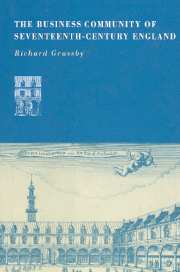Book contents
- Frontmatter
- Contents
- List of figures
- List of tables
- Preface
- List of abbreviations
- Explanatory notes
- Introduction: Questions and sources
- Part 1 Business as a career
- 1 The status of business
- 2 Obstacles to entry
- 3 Funding and risk
- 4 Necessity and choice
- Part 2 Paths to fortune
- Part 3 Life styles
- Conclusion: Private enterprise in a pre-industrial economy
- Bibliography
- Index
2 - Obstacles to entry
Published online by Cambridge University Press: 02 December 2009
- Frontmatter
- Contents
- List of figures
- List of tables
- Preface
- List of abbreviations
- Explanatory notes
- Introduction: Questions and sources
- Part 1 Business as a career
- 1 The status of business
- 2 Obstacles to entry
- 3 Funding and risk
- 4 Necessity and choice
- Part 2 Paths to fortune
- Part 3 Life styles
- Conclusion: Private enterprise in a pre-industrial economy
- Bibliography
- Index
Summary
The status of business depended in part on the economic advantages which it was presumed to offer. How realistic were the opportunities and what obstacles to entry might act as a disincentive? How numerous were the accessible openings and what did it cost to enter? How did business compare with alternative careers?
There was more than one route into business. Despite the Statute of Artificers, the rural and suburban textile, metal and food trades and the transportation industry could often be entered without apprenticeship. Although some mariners were formally apprenticed, it was also possible to just join a ship, rise to mate and master and act as supercargo and agent for merchants in the international and coasting trades. There was constant friction between Trinity House, which served as a guild for shipmasters, and the merchants; fishermen battled over monopolistic rights. But pursers and masters of colliers and merchantmen with their right of free freight moved unobtrusively from carriage into shipowning and dealing and from privateering into normal commerce and even planting. Carriers and drovers assumed banking functions. Professional men moved sideways into business.
Entry was also possible through acquiring stock in Companies or via commercial posts. Every trade and Company could be entered by redemption and favour; children of freemen could enter by patrimony. But the main method was through apprenticeship to a master in the appropriate trade. A Freeman of London could legally practise any trade. It is true that, in 1633, a committee of the Court of Aldermen excluded crafts from the liberal provisions of the Custom of London, which had been upheld in Tolley's Case of 1614; Common Council endorsed this policy in 1634, as did the Crown.
- Type
- Chapter
- Information
- The Business Community of Seventeenth-Century England , pp. 53 - 81Publisher: Cambridge University PressPrint publication year: 1995



